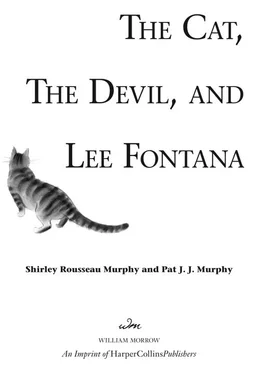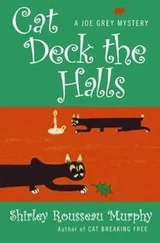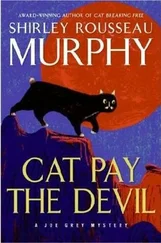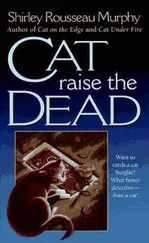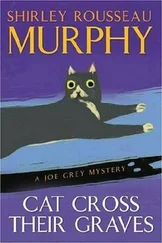Shirley Murphy - The Cat, the Devil, and Lee Fontana
Здесь есть возможность читать онлайн «Shirley Murphy - The Cat, the Devil, and Lee Fontana» весь текст электронной книги совершенно бесплатно (целиком полную версию без сокращений). В некоторых случаях можно слушать аудио, скачать через торрент в формате fb2 и присутствует краткое содержание. Год выпуска: 2014, Издательство: HarperCollins, Жанр: Старинная литература, на английском языке. Описание произведения, (предисловие) а так же отзывы посетителей доступны на портале библиотеки ЛибКат.
- Название:The Cat, the Devil, and Lee Fontana
- Автор:
- Издательство:HarperCollins
- Жанр:
- Год:2014
- ISBN:нет данных
- Рейтинг книги:5 / 5. Голосов: 1
-
Избранное:Добавить в избранное
- Отзывы:
-
Ваша оценка:
- 100
- 1
- 2
- 3
- 4
- 5
The Cat, the Devil, and Lee Fontana: краткое содержание, описание и аннотация
Предлагаем к чтению аннотацию, описание, краткое содержание или предисловие (зависит от того, что написал сам автор книги «The Cat, the Devil, and Lee Fontana»). Если вы не нашли необходимую информацию о книге — напишите в комментариях, мы постараемся отыскать её.
The Cat, the Devil, and Lee Fontana — читать онлайн бесплатно полную книгу (весь текст) целиком
Ниже представлен текст книги, разбитый по страницам. Система сохранения места последней прочитанной страницы, позволяет с удобством читать онлайн бесплатно книгу «The Cat, the Devil, and Lee Fontana», без необходимости каждый раз заново искать на чём Вы остановились. Поставьте закладку, и сможете в любой момент перейти на страницу, на которой закончили чтение.
Интервал:
Закладка:
“All the deposits and remaining records are in the safe. Bank is negotiating with the post office to buy the building and the safe, underwrite new quarters for them.”
Sounded dicey to Lee. What made those bank people think they could do business timely with the federal government? That transaction would probably take a decade to complete. How could you depend on bankers who were that gullible and trusting, themselves? Getting out of the car, he moved inside the one-story adobe building beside Raygor. A half-dozen wanted posters hung on the wall to his left, surly, vicious-looking men, and Lee stopped to study them; he always took a good look to see who was roaming loose out there, you never knew when a heads-up might be useful.
Knowing none of them, he committed their faces to memory, then took a good look at the layout of the post office. The activity at the postal counter made his pulse quicken. As a pudgy bank officer met them and led them past the counter, Lee saw that the clerks were not only selling stamps, they were counting out stacks of money, big money.
The clerk, broad of girth in his dark suit, his hair thinning on top and combed to the side above his protruding ears, ushered them into a back room, a combination storeroom and office. Raygor made sure to come in with Lee, to see that he opened the account all proper, that he filled out all the papers. The two of them sat crowded at a small desk beside the pudgy banker, jammed in among rows of metal file cabinets, bookshelves stacked with black binders, and a narrow cot pushed in between with a pillow and rumpled blankets.
“Night man,” the banker said, seeing Lee’s interest. “Because of maybe another fire, you know,” he said, gesturing vaguely, “because, it’s just a post office building and all.” Lee looked at the man as if bored, his heart lifting with another surge of interest. Beyond the bunk and bookshelves, a safe occupied the rest of the wall, a big iron walk-in door that must lead into an iron-clad room nearly as big as the office itself. Big old combination lock that, Lee thought, would take a skilled craftsman to finesse open, if you didn’t have the combination handy.
Behind the desk was a back door maybe to the alley, set between two barred windows. It had a simple spring lock, but below that a heavy hasp with a big padlock that hung open now, during business hours. The inner door through which they’d entered was solid-looking, too. It stood open, and he could see the counter and the line of waiting customers; his interest settled on two men standing just outside, each carrying a zippered canvas cash bag, both bags bulging invitingly. Glancing in at Lee and Raygor, they seemed to be waiting for their turn with the lone banker.
Lee, focused on them, hardly heard Raygor ramble on about how much interest Lee would earn on his prison-earned money. Some piddly sum that would make a goat laugh. In the end, all he got for his cash was a dinky little savings book filled out by the flabby-faced clerk—Lee’s prison money and ranch wages gone as completely as if sucked up by the desert wind, commingled with everyone else’s cash, sucked into a mass of bookkeeping that, with a few strokes of the pen, could be lost forever. As they left the office, moving out through the post office lobby, the two waiting men had been joined by five more, each in possession of a fat canvas money bag. Lee looked them over good, then glanced at Raygor, scowled, and pretended to study his new bank book.
Outside again, standing on the sidewalk, Raygor gave him a dozen more instructions that Lee didn’t listen to and then at last, having fulfilled his federal duty, he departed, leaving Lee on his own with a final admonition to stay out of trouble. Lee watched him pull away in his dirty Plymouth to head back across the empty desert, to harass some other unfortunate parolee. He’d been surprised when Raygor allowed him to keep part of his prison earnings. Lee had told him he needed to buy clothes, which the officer seemed to understand.
Now, alone at last, he wandered up the main street looking in the shop windows but his thoughts remained on the post office as the new job began to take shape. Yet at the same time, dark misgivings pushed at him, a fear of failure that wasn’t his doing, a dark and unrelenting message that this was not the right path to take. Angrily he shook away the invasive thoughts. Walking the wide main street, he passed a small grocery, an ice cream parlor, a drugstore, the broad windows of a dime store. He finally located a shoe repair shop about as wide as a tie stall. In the dim interior, he took a seat on the shoeshine chair. He removed his boots, sat in his stocking feet reading the local paper as the thin, bearded old cobbler put on new heels. He read about the 4H winners at the local fair, studied the picture of a pair of dark-haired sisters with their two fine, chunky Hereford steers. He read about the latest episode in the eternal battle over water rights, with statements by the mayors of four nearby towns, which Lee skipped. A local man had been assaulted by his wife, shot in the foot after he beat their two children. The local sheriff had made him move out and issued a restraining order. The wife was not charged.
He watched the cobbler polish his boots, then pulled them on and paid him, asking for directions to the saddlery. He found it two blocks down, the storefront set back behind thick adobe pillars, the sidewalk in front piled with heaps of dead crickets. Stepping carefully to avoid staining his clean boots, he moved on inside.
The dim interior seemed almost cool, and smelled pleasantly of leather. Wandering toward the back, he found a table of Levi’s, found a pair that fit him. He picked out two cotton frontier shirts, and bought some shorts and socks. Elbowing among the saddles and harness, he picked out a good, wide-brimmed straw Stetson. The saddles, and the headstalls hanging behind them, smelled so sweetly of good leather they made him homesick. He looked with speculation at a couple of used saddles, their wool saddle blankets matted with horsehair and smelling comfortably of sweat. He looked, but didn’t buy. Not here in town, where he might be remembered later.
Leaving the saddlery, he had a good Mexican lunch at the same little café where he and Jake had eaten when he first arrived in Blythe, enchiladas rancheros, beans, tortillas, an ice-cold beer in a frosted glass. Then, with the afternoon to kill, he strolled the town letting his plan ease slowly together. Working out the details, he didn’t sense the cat padding along behind him.
Trotting invisibly up the sidewalk, the cat flicked his ears, lashed his tail, and kept his attention focused on Lee as the old convict thought about the post office, smiling at his foolproof getaway that would leave no possible trail. The cat had no notion whether this plan would work, but to try to prevent Lee from any future criminal activity at all would be futile. The cat, silent and unseen, was caught up with keen curiosity in Lee’s subsequent moves as the old convict put this one together.
Soon the faded storefronts gave way to small wooden cottages set on the bare sand as forlorn as empty packing crates. Some of the sand yards were picked out by low wooden or wire fences. The metal box of a swamp cooler was attached to each house, chugging asthmatically, their ever-dripping water cutting little rivers through the sand. In one small yard two husky little Mexican boys were hollering and jumping up and down throwing each other off a tattered mattress attached to rusted springs. A little girl, younger than the two boys, looked up from where she was playing in the dirt and caught Lee’s eye. She pushed herself up and toddled toward him, gray powder dust falling from her hair and torn dress. She stopped just short of the sagging picket fence that separated them, stared up at him, screamed, squatted, and urinated a little puddle in the dirt. Lee’s eyes flicked from the child to the porch where a black-haired woman sat on the steps holding a naked baby to her hanging breast. Her huge belly stretched her polka dot dress. Their eyes caught, she gave him a tired smile, then he moved on.
Читать дальшеИнтервал:
Закладка:
Похожие книги на «The Cat, the Devil, and Lee Fontana»
Представляем Вашему вниманию похожие книги на «The Cat, the Devil, and Lee Fontana» списком для выбора. Мы отобрали схожую по названию и смыслу литературу в надежде предоставить читателям больше вариантов отыскать новые, интересные, ещё непрочитанные произведения.
Обсуждение, отзывы о книге «The Cat, the Devil, and Lee Fontana» и просто собственные мнения читателей. Оставьте ваши комментарии, напишите, что Вы думаете о произведении, его смысле или главных героях. Укажите что конкретно понравилось, а что нет, и почему Вы так считаете.
